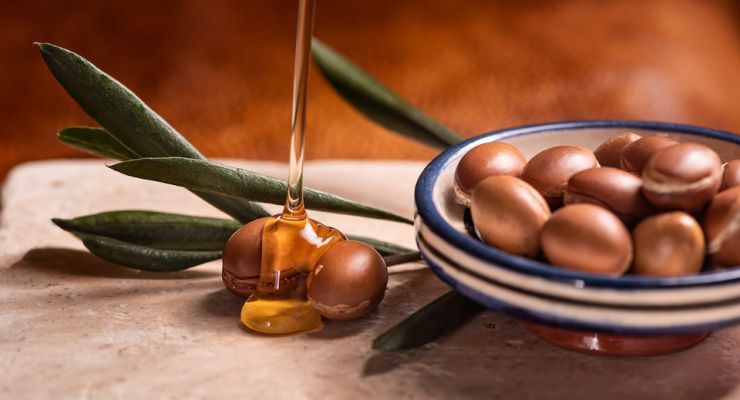You’re likely aware of argan oil’s many beauty benefits for the skin and hair. But what you may not know is that argan oil has been a staple in Moroccan homes for centuries — both for its use in culinary dishes and for its many health benefits. In fact, argan oil has been used for many years to treat acne, dry skin, wrinkles, and joint pain. But more recently, studies suggest that argan oil may be beneficial for diabetes. Here’s what you need to know about this exotic oil from Morocco.
What exactly is argan oil?
From the kernel found inside the argan nut — which is found inside the fruit of the argan tree — comes argan oil. This is the purest form of argan oil and the priciest. The argan tree, a natural defense against soil erosion, is found exclusively in the southwestern region of Morocco. While it may have recently taken the beauty world by storm, in reality, Moroccan or “Berber” women (an indigenous ethnic tribe of North Africa) have been producing and using the oil since approximately 600 BCE. Over the years, argan oil has evolved from a natural, tribal remedy and culinary ingredient to one of the most prestigious oils in the world, thanks to cosmetics companies all vying for the perfect anti-aging serum.
However, the oil you use on your hair and face is not the oil you can consume for health purposes, since there is likely very little pure argan oil in the mix of chemicals. Furthermore, there is a difference between the argan oil used in cosmetics and argan oil used for culinary and health purposes. The former version uses unroasted kernels while the latter uses roasted, giving it a nutty flavor.
Here’s what argan oil may do for diabetes
Argan oil consists mainly of fatty acids and several phenolic compounds. The various phenolic compounds found in argan oil are likely behind the antioxidant and anti-inflammatory properties, which help reduce symptoms of diabetes. In fact, an animal study published in the Journal of Complementary and Integrative Medicine found that the argan oil fed to diabetic rodents reduced blood sugar much better than the mice in the control group. As a bonus, it seemed to stabilize blood pressure, which didn’t occur with the untreated mice.
Early animal research suggests that argan oil may help prevent diabetes by affecting insulin production. In fact, one study found that through its antioxidant properties, argan oil reduced high blood pressure, hyperglycemia, and insulin resistance. Another study found that along with proper diet and lifestyle changes, argan oil reduces the metabolic effects of obesity. Because of its antioxidants, argan oil helped control metabolic syndrome in rats, a disease that includes obesity, hypertension, and insulin resistance.
Argan oil may help prevent heart disease
Argan oil is loaded with oleic acid, which is a monounsaturated, omega-9 fat. That’s the good heart-healthy oils found in foods like olive oil and avocados, according to research. A study on heart disease published in the British Journal of Nutrition found that healthy people, who took 15 grams of argan oil daily for 30 days, reduced “bad” LDL cholesterol by 16 percent and experienced a reduction in triglyceride levels by 20 percent. More studies are required to validate these findings.
Argan oil may also slow cancer growth
Thanks to the phenolic compounds, argan oil may also slow the rate of certain cancer cells. After applying polyphenolic compounds from argan oil to prostate cancer cells, researchers found it inhibited cancer cell growth by 50 percent. Another study — on breast and colon cancer — found that argan oil mixed with vitamin E increased the rate of cell death on cancer cell samples. While this is extremely promising, more testing is required.
What to look for when purchasing argan oil
Argan oil is generally sold for culinary and therapeutic purposes. There’s really not much of a difference between the two types — other than the price. Argan oil used in cooking is usually cheaper; although, a high-quality oil can sometimes cost as much per ounce as therapeutic oil. When using for therapeutic purposes, look for organic, cold-pressed oil labeled 100 percent pure. Argan oil has a clear consistency and a characteristic golden hue. It’s generally considered safe for consumption; however, because it contains tocopherols, a type of vitamin E, it may slow blood clotting and interfere with anticoagulants such as warfarin.
Argan oil vs. Moroccan oil
In the world of beauty, argan oil is usually marketed as Moroccan oil. However, Moroccan oil found in cosmetics and hair products is realistically a modified version of argan oil. Typically, it’s a blend of argan oil mixed with other oils and additives — so it’s not a pure form of argan oil. Products labeled as Moroccan oil are often more liquid and runnier than products blended with pure argan oil. You should never ingest Moroccan oil since it’s typically combined with ingredients not meant for ingestion.
For centuries, argan oil has been used topically and internally to treat certain conditions — with great success. More recently, its antioxidants, nutrients, and anti-inflammatory compounds show promise in diabetes, heart, and cancer research. If you love argan oil in your beauty regimen, you may want to try it in your health regimen as well.
-Susan Patterson

